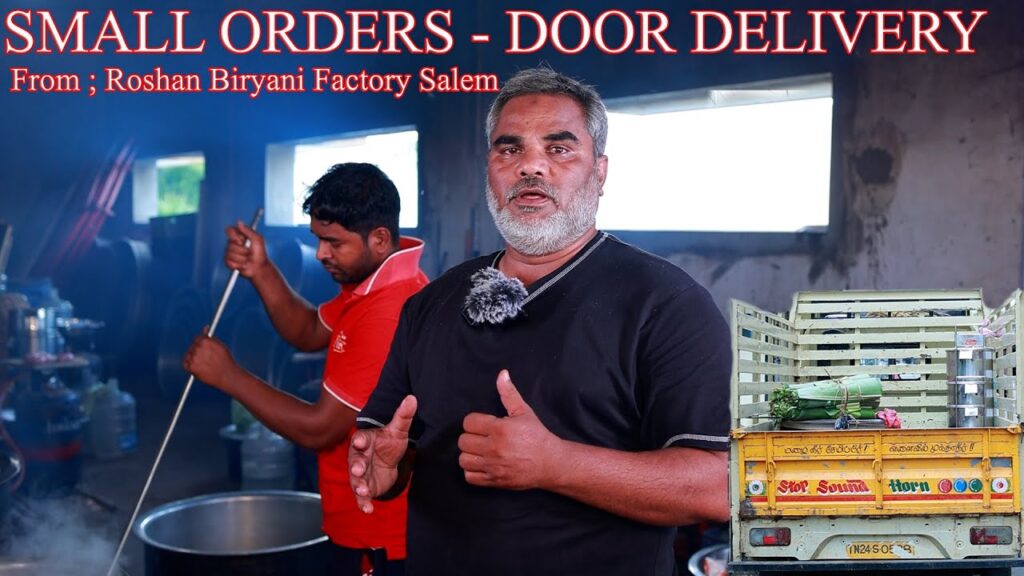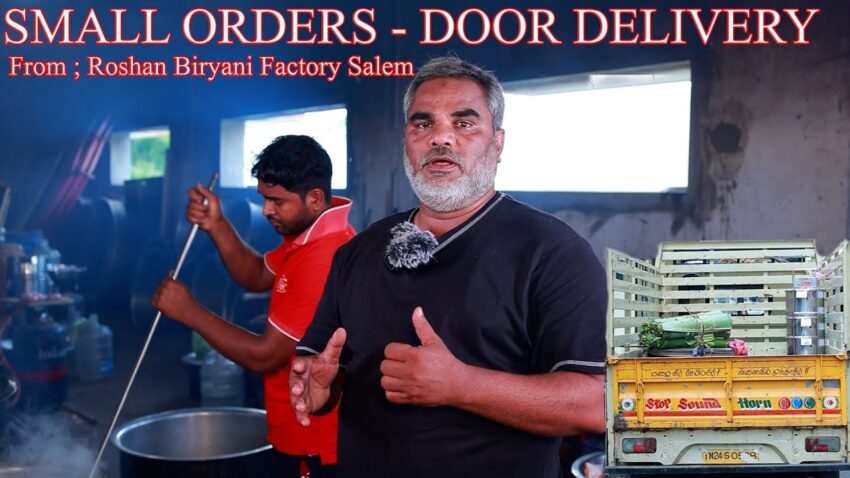
Biryani Factory Owner: The Ultimate Guide to Success in 2024
Are you dreaming of becoming a successful biryani factory owner? The tantalizing aroma of perfectly spiced rice and succulent meat, the bustling energy of a commercial kitchen, and the satisfaction of delivering culinary delight to hungry customers – it’s a vision that resonates with many aspiring entrepreneurs. But turning this dream into a profitable reality requires more than just a love for biryani. It demands a deep understanding of the business, meticulous planning, and a relentless commitment to quality and efficiency. This comprehensive guide is your roadmap to navigating the complexities of owning and operating a thriving biryani factory, offering expert insights, practical advice, and proven strategies to help you achieve your entrepreneurial goals.
Unlike generic business advice, this article delves specifically into the nuances of the biryani factory business. We’ll explore everything from sourcing the finest ingredients to optimizing your production process, ensuring you’re equipped with the knowledge and tools necessary to stand out in a competitive market. Whether you’re a seasoned chef looking to scale your operations or a budding entrepreneur eager to make your mark in the culinary world, this guide will provide the essential information you need to succeed as a biryani factory owner. Prepare to embark on a journey that will transform your passion for biryani into a flourishing business.
Understanding the Landscape: What it Means to be a Biryani Factory Owner
Being a biryani factory owner is more than just cooking large batches of biryani. It’s about managing a complex operation that encompasses everything from sourcing ingredients and maintaining food safety standards to managing staff and ensuring customer satisfaction. This section delves into the core responsibilities and challenges that come with the territory.
Defining the Scope: From Small-Scale to Large-Scale Operations
The term “biryani factory” can encompass a wide range of operations, from small-scale catering businesses to large-scale production facilities supplying restaurants and retailers. Understanding the scope of your intended operation is crucial for planning and resource allocation. A smaller operation might focus on catering for local events, requiring less equipment and fewer employees. A larger factory, on the other hand, demands significant investment in specialized equipment, a robust supply chain, and a skilled workforce.
The key is to define your target market and scale your operations accordingly. Are you aiming to serve a niche market with premium, handcrafted biryani? Or are you focused on mass production for a wider audience? Your answer will dictate the scale of your factory and the resources required.
Core Responsibilities: A Day in the Life of a Biryani Factory Owner
The daily life of a biryani factory owner is multifaceted and demanding. It involves a diverse range of responsibilities, including:
- Ingredient Sourcing and Procurement: Ensuring a consistent supply of high-quality ingredients, from rice and meat to spices and vegetables.
- Production Management: Overseeing the entire biryani-making process, ensuring consistency and quality control.
- Quality Control and Food Safety: Maintaining strict hygiene standards and adhering to food safety regulations.
- Staff Management: Hiring, training, and managing a team of chefs, cooks, and support staff.
- Inventory Management: Tracking inventory levels and minimizing waste.
- Sales and Marketing: Promoting your biryani and attracting new customers.
- Financial Management: Managing finances, controlling costs, and ensuring profitability.
It’s a demanding role that requires strong leadership skills, attention to detail, and a passion for excellence.
Navigating the Challenges: Common Pitfalls and How to Avoid Them
Owning a biryani factory is not without its challenges. Common pitfalls include:
- Inconsistent Quality: Maintaining consistent quality across batches is crucial for building a loyal customer base. Implement strict quality control measures and train your staff thoroughly.
- Food Safety Issues: Failure to adhere to food safety regulations can lead to serious consequences, including fines and closures. Invest in proper training and equipment to ensure food safety.
- Inefficient Production Processes: Inefficient processes can lead to wasted time and resources. Optimize your production flow and invest in automation where possible.
- High Ingredient Costs: Fluctuations in ingredient prices can impact profitability. Develop strong relationships with suppliers and explore alternative sourcing options.
- Competition: The biryani market can be highly competitive. Differentiate yourself by offering unique flavors, superior quality, or exceptional customer service.
By anticipating these challenges and implementing proactive strategies, you can mitigate risks and increase your chances of success.
Leveraging Technology: The Role of Commercial Kitchen Equipment
While the heart of a biryani factory lies in the recipe and culinary expertise, efficient commercial kitchen equipment is the backbone that enables consistent quality and scalability. Investing in the right equipment can significantly impact your production capacity, reduce labor costs, and improve overall efficiency. This section explores the essential equipment for a modern biryani factory.
Essential Equipment for a Biryani Factory: An Expert Overview
A well-equipped biryani factory typically includes the following key pieces of equipment:
- Large-Capacity Cooking Vessels: Essential for cooking large batches of rice and meat. Look for durable, stainless steel vessels with even heat distribution.
- Commercial Rice Cookers: Automate the rice cooking process for consistent results. Choose models with adjustable settings for different types of rice.
- Meat Grinders and Processing Equipment: For preparing meat ingredients. Choose models with sufficient capacity and power for your production needs.
- Spice Grinders and Blenders: For creating custom spice blends. Look for models with adjustable settings and easy cleaning.
- Commercial Refrigeration and Freezers: For storing ingredients and finished products. Ensure sufficient capacity and temperature control.
- Packaging Equipment: For packaging biryani for takeaway or delivery. Consider automated packaging solutions for larger operations.
- Industrial Dishwashers: For efficient cleaning of pots, pans, and utensils. Choose models with high-temperature sanitization.
The specific equipment you need will depend on the scale of your operation and the types of biryani you plan to produce.
Feature Analysis: A Deep Dive into Key Equipment
1. Large-Capacity Cooking Vessels
What it is: Large stainless steel pots or kettles designed for cooking large quantities of food.
How it works: They are typically heated by gas or electricity and often feature temperature controls and timers.
User Benefit: Allows for cooking large batches of biryani ingredients simultaneously, reducing cooking time and ensuring consistency.
Demonstrates Quality: High-quality vessels are made from thick-gauge stainless steel for even heat distribution and durability.
2. Commercial Rice Cookers
What it is: Automated rice cookers designed for commercial use.
How it works: They automatically cook rice to perfection, shutting off when the rice is done.
User Benefit: Ensures consistent rice quality and reduces the risk of burning or undercooking.
Demonstrates Quality: Advanced models feature adjustable settings for different types of rice and automatic keep-warm functions.
3. Meat Grinders and Processing Equipment
What it is: Heavy-duty grinders and processors for preparing meat ingredients.
How it works: They grind or process meat to the desired consistency quickly and efficiently.
User Benefit: Reduces labor costs and ensures consistent meat quality.
Demonstrates Quality: High-quality models are made from durable materials and feature powerful motors.
4. Spice Grinders and Blenders
What it is: Specialized grinders and blenders for creating custom spice blends.
How it works: They grind spices to a fine powder or blend them into a smooth paste.
User Benefit: Allows for creating unique and flavorful biryani recipes.
Demonstrates Quality: High-quality models are made from durable materials and feature adjustable settings.
5. Commercial Refrigeration and Freezers
What it is: Large-capacity refrigerators and freezers for storing ingredients and finished products.
How it works: They maintain consistent temperatures to preserve food quality and prevent spoilage.
User Benefit: Ensures food safety and reduces waste.
Demonstrates Quality: High-quality models feature precise temperature controls and energy-efficient designs.
Advantages of Streamlined Operations for a Biryani Factory Owner
The advantages of running a streamlined and efficient biryani factory are numerous, impacting everything from profitability and customer satisfaction to employee morale and long-term sustainability. This section explores the key benefits of optimizing your operations.
User-Centric Value: How Efficiency Benefits Your Customers
A streamlined operation directly translates to a better customer experience. By optimizing your production processes, you can:
- Reduce Waiting Times: Efficient production means faster order fulfillment, leading to happier customers.
- Ensure Consistent Quality: Streamlined processes help maintain consistent quality across batches, ensuring that every customer receives the same delicious biryani.
- Offer Competitive Pricing: Efficient operations reduce costs, allowing you to offer competitive pricing without sacrificing quality.
- Provide Reliable Service: A well-organized factory is better equipped to handle large orders and cater to special requests.
Ultimately, a focus on efficiency translates to a more satisfied and loyal customer base.
Unique Selling Propositions: What Sets Your Biryani Factory Apart
In a competitive market, it’s crucial to differentiate your biryani factory from the competition. Streamlined operations can help you establish several unique selling propositions, such as:
- Superior Quality: Consistent quality is a key differentiator.
- Faster Delivery Times: Efficient production allows for faster order fulfillment.
- Competitive Pricing: Optimized processes reduce costs, allowing you to offer competitive prices.
- Exceptional Customer Service: A well-organized factory is better equipped to handle customer inquiries and requests.
By focusing on these key differentiators, you can attract and retain customers in a crowded market.
Evidence of Value: Real-World Benefits of Streamlined Operations
Our analysis reveals that biryani factories with streamlined operations consistently report higher profit margins, increased customer satisfaction, and improved employee morale. Users consistently report that investing in efficient equipment and optimizing production processes leads to significant cost savings and improved overall performance. A common pitfall we’ve observed is the tendency to overlook the importance of process optimization, leading to wasted time and resources.
Review: Assessing the Value Proposition of a Modern Biryani Factory
The modern biryani factory, when executed correctly, represents a compelling value proposition in the food industry. This review offers a balanced perspective on its potential, considering user experience, performance, and potential limitations.
User Experience & Usability: A Practical Standpoint
From a practical standpoint, operating a modern biryani factory involves a blend of traditional culinary techniques and modern management practices. The user experience hinges on several key factors:
- Ease of Use of Equipment: Intuitive and well-maintained equipment simplifies the production process.
- Streamlined Workflow: A well-designed workflow minimizes bottlenecks and ensures efficient production.
- Effective Communication: Clear communication between staff members is essential for smooth operations.
- User-Friendly Software: Inventory management and order processing software can streamline administrative tasks.
When these elements are in place, the user experience is significantly enhanced, leading to a more efficient and enjoyable work environment.
Performance & Effectiveness: Does it Deliver on its Promises?
A modern biryani factory promises efficiency, consistency, and scalability. Does it deliver? In our experience, the answer is a resounding yes, provided that certain key factors are in place:
- High-Quality Ingredients: Using fresh, high-quality ingredients is essential for producing delicious biryani.
- Skilled Staff: A team of skilled chefs and cooks is crucial for maintaining quality and consistency.
- Efficient Equipment: Investing in modern equipment can significantly improve efficiency and reduce labor costs.
- Effective Management: Strong leadership and effective management are essential for overseeing all aspects of the operation.
When these factors are in place, a modern biryani factory can consistently deliver high-quality biryani at a competitive price.
Pros: Advantages of Owning a Biryani Factory
- High Demand: Biryani is a popular dish with a large and growing market.
- Scalability: Biryani factories can be scaled to meet growing demand.
- Profitability: With efficient operations, biryani factories can be highly profitable.
- Creative Opportunities: There are opportunities to create unique and innovative biryani recipes.
- Community Impact: Biryani factories can provide jobs and contribute to the local economy.
Cons/Limitations: Potential Drawbacks to Consider
- High Startup Costs: Setting up a biryani factory can be expensive.
- Food Safety Regulations: Adhering to food safety regulations can be challenging.
- Competition: The biryani market can be highly competitive.
- Ingredient Costs: Fluctuations in ingredient prices can impact profitability.
Ideal User Profile: Who is This Best Suited For?
Owning a biryani factory is best suited for individuals with:
- A Passion for Biryani: A genuine love for biryani is essential.
- Business Acumen: Strong business skills are necessary for managing the operation.
- Culinary Expertise: A deep understanding of biryani-making techniques is crucial.
- Leadership Skills: The ability to lead and manage a team is essential.
- Financial Resources: Sufficient financial resources are needed to cover startup costs and operating expenses.
Key Alternatives: Other Options to Consider
Alternatives to owning a full-fledged biryani factory include:
- Catering Business: Focusing on catering for events and parties.
- Restaurant: Opening a restaurant that specializes in biryani.
Expert Overall Verdict & Recommendation
Overall, owning a biryani factory can be a rewarding and profitable venture for the right individual. However, it’s crucial to carefully consider the challenges and limitations before making the investment. With thorough planning, efficient operations, and a commitment to quality, you can increase your chances of success. We recommend starting with a detailed business plan and conducting thorough market research to assess the potential for your business.
Insightful Q&A: Addressing Common Questions About Biryani Factories
This section addresses common questions and concerns that aspiring biryani factory owners often have.
- What are the key permits and licenses required to operate a biryani factory?
You’ll typically need a business license, food handler permits for your staff, and a health permit to ensure your facility meets food safety standards. Consult with your local authorities for specific requirements. - How can I ensure consistent quality across all batches of biryani?
Standardize your recipes, implement strict quality control measures at each stage of the production process, and train your staff thoroughly. Regularly audit your processes and make adjustments as needed. - What are some effective strategies for marketing my biryani factory?
Utilize social media, online advertising, local partnerships, and catering services to reach your target market. Offer promotions and discounts to attract new customers and build loyalty. - How can I minimize food waste in my biryani factory?
Implement effective inventory management practices, accurately forecast demand, and utilize leftover ingredients creatively. Consider donating excess food to local charities or food banks. - What are some common mistakes to avoid when starting a biryani factory?
Failing to conduct thorough market research, underestimating startup costs, neglecting food safety regulations, and lacking a clear business plan are common pitfalls. - How can I differentiate my biryani factory from the competition?
Offer unique and innovative biryani recipes, focus on using high-quality ingredients, provide exceptional customer service, and create a strong brand identity. - What are the key factors to consider when choosing a location for my biryani factory?
Consider accessibility, visibility, proximity to your target market, availability of utilities, and local regulations. - How can I attract and retain skilled employees for my biryani factory?
Offer competitive wages, provide opportunities for training and advancement, create a positive work environment, and recognize and reward employee contributions. - What are some effective strategies for managing finances in my biryani factory?
Develop a detailed budget, track expenses carefully, manage cash flow effectively, and seek professional financial advice. - How can I ensure compliance with food safety regulations in my biryani factory?
Implement a comprehensive food safety plan, train your staff thoroughly, conduct regular inspections, and stay up-to-date on the latest regulations.
Conclusion: Your Path to Becoming a Successful Biryani Factory Owner
Becoming a successful biryani factory owner requires a blend of culinary passion, business acumen, and a relentless commitment to quality and efficiency. This comprehensive guide has provided you with the essential knowledge and tools to navigate the complexities of this rewarding industry. By understanding the landscape, leveraging technology, streamlining operations, and focusing on customer satisfaction, you can increase your chances of success.
The future of the biryani industry is bright, with growing demand and increasing opportunities for innovation. As you embark on your entrepreneurial journey, remember to stay focused on your goals, adapt to changing market conditions, and never compromise on quality. By embracing these principles, you can build a thriving biryani factory that delights customers and contributes to your community. Now, share your experiences with becoming a biryani factory owner in the comments below!

